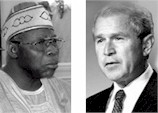 THE
WHITE HOUSE (FinalCall.com)�Despite the widely held perception that
President George W. Bush has turned a cold shoulder to African leaders,
Nigeria�s President Olusegun Obasanjo pledged that Africa�s most
populous nation will support the U.S. anti-terror fight.
THE
WHITE HOUSE (FinalCall.com)�Despite the widely held perception that
President George W. Bush has turned a cold shoulder to African leaders,
Nigeria�s President Olusegun Obasanjo pledged that Africa�s most
populous nation will support the U.S. anti-terror fight.
"We are part of that coalition, and we will remain
steadfastly part of that coalition," Mr. Obasanjo told reporters in the
Rose Garden Nov. 2, following his meeting with Mr. Bush�the first for an
African head of state since Sept. 11.
Nigeria and South Africa are the key U.S. partners on
the continent, and oil-producing Nigeria is particularly important
because of a huge Islamic population. "We are unique in a way, because
we have the highest population of Muslims in Africa," Mr. Obasanjo
continued.
"We are also unique in the fact that almost 50 percent
of our citizens are Muslims, and almost 50 percent are Christians. That
has advantages and also has disadvantages. It is up to us to let our
people, the citizens of our country, know that whatever faith they
belong to, they are not safe as long as we allow terrorism to take hold
of the world."
Mr. Bush admitted that he is counting on the Nigerian
leader to send "a message of tolerance and respect to other heavily
Muslim nations. I assured him, and assure those Muslims who live in his
country, that our war that we now fight is against terror and evil. It�s
not against Muslims," he said.
Mr. Bush deflected the persistent question that input
from Black leaders in this country and from African leaders has been
ignored since the World Trade Center and Pentagon attacks. "I�m proud to
have him by my side," the president said of Mr. Obasanjo, when asked by
a reporter "why did it take so long" to arrange a visit by an African
leader. He did not address the delay in scheduling the meeting.
White House sources have cited logistical problems and
scheduling conflicts, although Mr. Obasanjo was reportedly ready to come
to Washington in mid-September when he concluded a visit with British
Prime Minister Tony Blair in London.
Africa observers have long argued that the U.S. would be
wise to engage Mr. Obasanjo and other African leaders, not just because
of their connections to the Muslim world, but because of security
interests.
Three years ago terrorists struck against U.S. interests
in Africa: the 1998 bombings of U.S. embassies in Kenya and Tanzania
were�like the Sept. 11 attacks�blamed on Osama bin Laden�s Al-Qaeda
network, and those governments were credited with making swift arrests
and bringing suspects to trial in those cases.
"A lot of the source of racial tension that (this)
country has is because white people generally don�t listen to Black
people," said Dr. David Bositis, of the Joint Center for Political and
Economic Studies. "And those people who have an opposing view ridicule
what Black leaders have to say or they accuse Black leaders of being
racist or anti-semitic, or out of touch."
African leaders themselves may have kept their silence
about not being consulted more openly about the World Trade Center and
Pentagon incidents, in part, because "they are probably still trying to
reconcile the U.S. walkout from the World Conference Against Racism in
Durban," Acklyn Lynch, professor of Africana Studies at the University
of Maryland Baltimore, told The Final Call.
Then, African leaders must deal with two major
challenges, Prof. Lynch said, "globalization and the increasing
marginalization of their people, and the debate over reparations,
because their people are talking about it, and many of them are
agonizing about where they�re going to stand on those two questions."

![]()